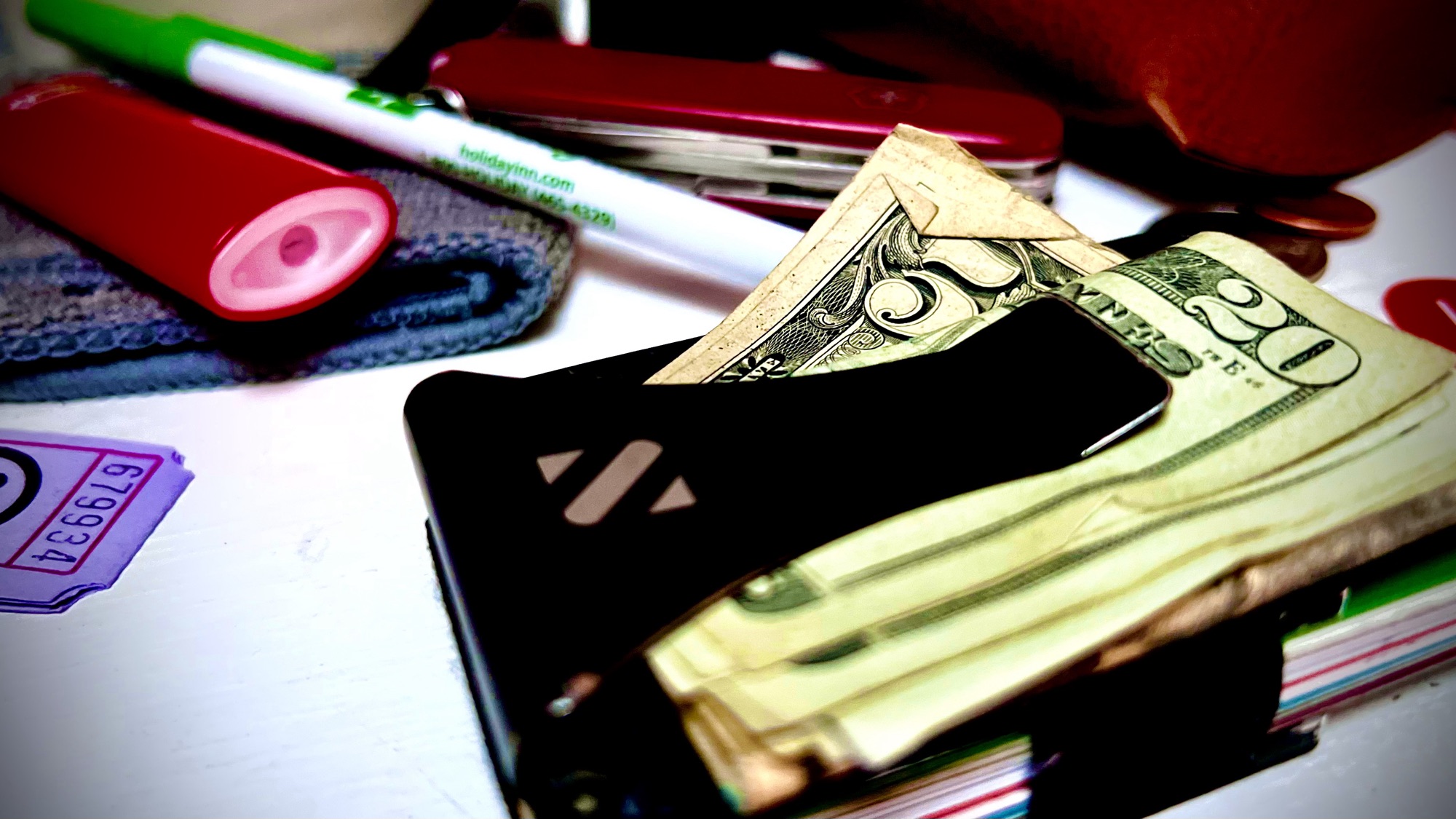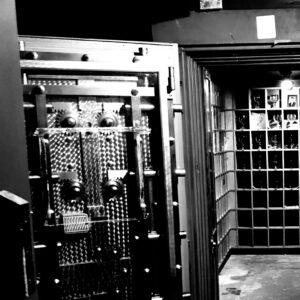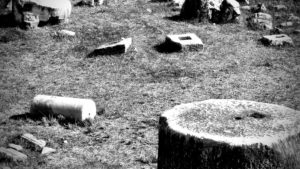Fred Skeller looked around in wonder at his childhood shopping mall, which had somehow transformed from a nearly abandoned ruin into the hustling, bustling, peanut-and-cigarette-scented galleria of his youth. His immediate thought was to whip out his phone and start taking pictures, but something held him back. Instead, instinct kicked in: he was standing in the middle of a steady stream of foot traffic, and ran the very real risk of getting in someone’s way. He looked around hurriedly in search of an escape, then shuffled backwards, turned, and casually jogged to the side of the tall, brown-tiled planter beside the stage.
Safely removed from the threat of posing an inconvenience, he evaluated his situation, his new surroundings. Firstly, he was definitely in the past—or a remarkably realistic facsimile thereof. Before him, a fully operational Peanut Shack shone in wood-paneled glory, trays of cashews glowing under heat lamps, the cartoon dog of the Slush Puppie machine beckoning coyly. Behind him, the wall of the planter was reassuringly solid, the tile cool, the broad leaves of the monstera plant brushing the back of his neck. To the right, the corridor that previously led (or, would lead; he wasn’t an experienced time traveler and was shaky on tenses) to the newer wing of the mall terminated instead in a set of glass doors with a parking lot behind. To his left, the old stage, complete with three gushing water fountains. The bottom of the pool glittered with coins; he had forgotten that detail in his prior memories.
Beyond the stage, the long main thoroughfare was no longer a desolate alley clad in faux-marble, but was teeming with people walking on wood-patterned tile. More importantly, it was lined with bright, active, open shops.
The shops! The toy store, the Hallmark, the Radio Shack—another one he’d somehow missed on his initial mental list; who hadn’t secretly lusted for a remote-control robot arm tucked under their Christmas tree? Pairs of feet crossed from tile to carpet and back again, the border between mall and store demarcated by a metal slot where the after-hours security gate would click into place. But everything was open now, and his head swirled from watching the sudden activity.
The colors didn’t help. He had forgotten the popularity of neon, especially among the younger passers-by. For all the skate shoes and Ocean Pacific board shorts, I might have stumbled upon the inaugural X Games, he thought. He wondered how many of them had actually seen the ocean. He hadn’t, at that age.
There were also plenty of shoulder pads, and heads sporting feathered hair. And definitely more mullets. He found it curious that the differences weren’t really all that jarring. Shows and movies made a big thing of fashion trends, but the truth was that most people were wearing some version of jeans or skirts, t-shirts or button-downs, sneakers or heels, or some other combination of typical contemporary body coverings. While the cut of the cloth or the color of the shoelaces might have been a little unusual, it wasn’t exactly science fiction.
Which was fortunate, he realized, because it could have just as easily gone the other way. He observed a few sideways glances at his own jeans and quarter-zip pullover, but he suspected that they were reacting just as he was: something was slightly off, but not enough to draw a verbal reaction.
His thoughts turned back to his overall situation, and what to do next. The fact was, he was experiencing a frighteningly realistic simulation of what it was like to be leaning against a planter in a shopping mall in the late 80s, and he wasn’t yet completely sure what to do with that. He moved his hand to his left jeans pocket and felt the reassuring rectangle of his phone. Once again, though, he felt a sense of warning. He wondered at this, and concluded that it was like realizing you were asleep in a dream and immediately awakening; his subconscious was telling him to avoid doing anything unusual that might similarly trigger an abrupt end to the experience. He pulled his hand away.
Realistically, there was no such thing as magic or time travel, he knew. It was likely to be a hallucination, or even a reaction to some terrible medical catastrophe—I might be dying right now, he thought. But then again, you didn’t get the chance to relive a childhood memory in such incredible detail every day, so if it was a hallucination, so be it. He would enjoy it, even if that meant not thinking about it too hard.
He relaxed, just as a kid walked by in a bright yellow-green Gotcha! T-shirt. The hit of pure uncut nostalgia made him wonder why he had given even the briefest thought to his own reality, and he floated in neon-hued reverie.
The smell of peanuts saved him. Peanut Shack, he remembered. His eyes refocused on a cartoon dog and his ceremonial cup of flavored ice, hovering above the selection of warm nuts like the patron saint of high-fructose corn syrup. He had never completed his earlier train of thought on what he should do next, but an idea was rapidly forming.
The Peanut Shack is here, he thought. I’m here. I can get a…
“Slush Puppie!” he said, a bit too loudly. A girl with bangs like a tidal wave looked at him strangely, and walked a little faster.
He felt inside his other pocket, the opposite one from where he kept his phone, and he closed his hand around his wallet. He was here, somewhere in the late 80s, and he had money. Money he could spend at the Peanut Shack. The Peanut Shack that sold Slush Puppies. Slush Puppies that came in size large, and there was nobody here with the authority to tell him he couldn’t have one.
Fred felt elation that bordered on giddiness, a rising sensation of butterflies like a first kiss on a Tilt-a-Whirl. He strode confidently forward, weaving around small packs of teenagers and adults with strollers, walked up to the counter, and stood: back straight, eyes forward, hands resting comfortably on the counter, awaiting the fulfillment of his destiny.
He awaited, patiently. He continued awaiting, then awaited some more. He cleared his throat.
Destiny, it appeared, depended on the whims of a teenage girl wearing a smock, a silly hat, and an expression of terminal boredom. He could see her in the back, chewing gum and reading a magazine that featured photos of young men with spiky hair and popped collars.
He looked around. He sniffed, loudly. He considered saying something, but his own experiences as a surly teen clerk warned him that such efforts would be ineffective, perhaps even counterproductive.
Finally, the girl looked up, saw him, then looked down at the floor somewhere on the continuum between Fred and the magazine, and slowly walked to the register. There she stood silently, leaning, her gaze now focused on a region of empty space about two inches away from his right ear. He looked over for a second to make sure he hadn’t somehow acquired a parrot.
“Hey,” he said. “Hi. Can I get a Slush Puppie, please? Bahama Mama,” he quickly added.
The girl’s only acknowledgement of his request was that she turned and started to grab a cup. “Large, please!” he said as he saw her reach for a medium. “I really like Slush Puppies,” he continued. “Can’t get them where I’m from. It’s been years, since…” He trailed off. He scratched at his chin and made a show of inspecting some Corn Nuts.
Meanwhile, the process had begun. He couldn’t see every detail, but he heard the skwick skwick skwick of the syrup pump, then the louder kschhhhhhh of the slush pouring into the cup. He saw her reach over for a lid, and heard the thop of it snapping into place.
She turned from the machine and put the cup down on the counter in front of him. It made a hollow thwup sound against the Formica. At last, she spoke.
“Anything else?”
He considered his options for a moment. A small bag of something might be nice, he mused. But ultimately, he knew the true object of his greatest desire: slush. It wouldn’t do to adulterate it with dried pineapple and Reese’s Pieces.
“No, that’s ok, thanks,” he said.
She banged on the register. It was loud and mechanical and didn’t beep, it clacked. “Three eighteen,” she said.
He reached into his pocket, pulled out a battered lump of black leather, and flipped it open. A capitalist menagerie greeted him: several credit cards, a debit card, a driver’s license, a supermarket club card, a gift card from Target, and two old movie ticket stubs that weren’t technically cards at all, but were avoiding disposal by hiding with the good plastic. He instinctively reached for a bank Visa he used for most of his casual expenses, then stopped.
It’s the 80s, he realized. We’re twenty years from McDonald’s taking credit cards, much less a snack stand at the mall. Using a credit card to pay for a soft drink in 1980-whatever was the equivalent of him trying to use a personal check in his own time to pay for…well, to pay for McDonald’s.
He could feel the impatient gaze of the annoyed teen boring into his head like the laser from Real Genius, exploding a house through youthful impertinence and the expanding properties of popcorn. He opened the billfold portion of the wallet hurriedly, then almost sighed in relief. A small, dull sheaf of twenties was tucked into the pocket, doing the opposite of glimmering. He was saved!
He started to remove one, but stopped again.
Something was still wrong. He couldn’t quite put his finger on it, but just as with his cellphone camera, he felt as though he was making a mistake. Nobody pays for a drink with a twenty, he thought. She’ll probably think it’s weird. Maybe she’ll get her manager. He frowned. Does she even have a manager? Either way, it didn’t look good.
Maybe he was making too big a deal of it. I’ll just tell her, sorry, just got paid, smallest thing I have. That should cover it, he reasoned.
He held out the crisp new twenty. The girl stared at it. He stared at the girl. He looked down at the bill, then back up at the girl. She looked up at him and spoke for the second time in their encounter.
“Um, that’s not real,” she said.
His eyes grew wide and he could feel the blood rushing to his face like a third-grader with a monkey-bar obsession. He had read somewhere that not everyone could voluntarily make a rushing sound inside their ears, but it happened now without his direct involvement. His throat tightened. He looked down at the bill in his hand.
It looks normal to me, he thought. I’m sure she’s seen one before. He had heard stories of cashiers who refused to believe that a two-dollar bill was real tender.
But then it dawned on him. Just a normal, crisp, brand-new twenty dollar bill. Which was redesigned in—he paused—some year, but absolutely at a point much later than the 1980s.
She thinks it’s counterfeit. And it was. Sort of, he thought. I mean, how does that work, when a bill hasn’t been printed yet?
Then, She’s definitely not going to take this bill, and, She might even call the police.
He needed to act quickly. He had wasted too much time already.
“Oh geez!” he said, laughing in a way that he hoped sounded genuine. “I’m so sorry!” He pulled the bill back before she tried to claim it as evidence in the time-travel fraud trial his brain had started to envision.
She narrowed her eyes. He still needed a reason why he was carrying fake money, he decided, something to disarm any suspicion. The perfect answer came to him. “Kids!” he said. “My kids…they’re not supposed to mess around with my wallet. They must’ve put their play money in here.”
The girl nodded imperceptibly. “Mmm,” she said. She seemed to be buying it.
Or she doesn’t actually care, he thought.
Fred continued as he stuffed the bill unceremoniously back into his wallet. “I’ll tell you what, they’re gonna get it when I get home!” He shook his fist a bit. Now the girl drew back a little. Too much, he thought. “Anyway, let me see if there’s anything in here…”
He looked down at the wallet, spirits rapidly sinking. It was hopeless. He used plastic whenever he could. The cash he carried was usually only twenties—“yuppie food stamps” he called them sometimes, since it was usually the only denomination available from the ATM, and was all anyone of his generation ever carried, if they had cash at all. None of this would help.
He was in some sort of incredible once in a lifetime magical time warp situation, and it was about to be ruined because he didn’t have so much as an emergency quarter. He could feel the dream of his very own, unshared, large Bahama Mama Slush Puppie slipping rapidly through his fingers.
Like so much slush, he thought.




Pingback: Slush Puppie – Part 1 - january-river.net
Pingback: Slush Puppie – Part 3 - january-river.net